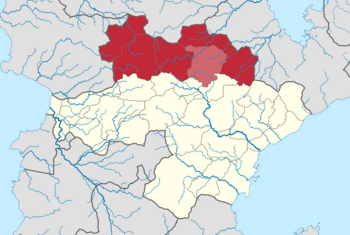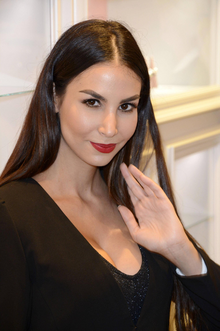Gandhari Kurdistan: Difference between revisions
No edit summary |
No edit summary |
||
| Line 1: | Line 1: | ||
[[File:Kurdish region in Gandhara.png|thumb|right|350px|A map displaying the Kurdish-majority region of northern Gandhara.<br />{{legend|#c12838|Kurds form an overall majority}}{{legend|#d0676f|Kurds form a relative majority}}]] | [[File:Kurdish region in Gandhara.png|thumb|right|350px|A map displaying the Kurdish-majority region of northern Gandhara.<br />{{legend|#c12838|Kurds form an overall majority}}{{legend|#d0676f|Kurds form a relative majority}}]] | ||
'''Gandhari Kurdistan''' is an unofficial name for the parts of northern [[Gandhara]] where [[Wikipedia:Kurds|Kurds]] form the predominant ethnic group. It includes | '''Gandhari Kurdistan''' is an unofficial name for the parts of northern [[Gandhara]] where [[Wikipedia:Kurds|Kurds]] form the predominant ethnic group. It includes six [[Governorates of Gandhara|Governorates]]: Bayazidi, Khani, Dinawar, Tayran, Mawardi, and Caesarea. | ||
The region covers an area of 166,227 km² (64,181 sq mi), constituting almost 25% of Gandhara's total area. According to the 2016 Census, the region has a total population of 2,030,005, just above 6% of the country's total population. The unofficial capital is considered to be [[Araz]], the capital of the Tayran Governorate, which is a popular city among students due to the presence of prestigious universities and foreign companies. | The region covers an area of 166,227 km² (64,181 sq mi), constituting almost 25% of Gandhara's total area. According to the 2016 Census, the region has a total population of 2,030,005, just above 6% of the country's total population. The unofficial capital is considered to be [[Araz]], the capital of the Tayran Governorate, which is a popular city among students due to the presence of prestigious universities and foreign companies. | ||
| Line 10: | Line 10: | ||
Ethnic groups had very little rights under the rule of the Sultans, which led to internal conflicts in which ethnic groups opposed the rule of the central government. An example is the Kurdish Rebellion of 1869–73. After the downfall of the Gandhari Empire and the foundation of the [[Al-Mansur dynasty]], the relationship between the Kurds and the central government remained tense. | Ethnic groups had very little rights under the rule of the Sultans, which led to internal conflicts in which ethnic groups opposed the rule of the central government. An example is the Kurdish Rebellion of 1869–73. After the downfall of the Gandhari Empire and the foundation of the [[Al-Mansur dynasty]], the relationship between the Kurds and the central government remained tense. | ||
During the [[Gandhari Revolution]], the [[Arab Socialist Union of Gandhara]], a [[Wikipedia:Political party|political]] and [[Wikipedia:Military organization|military organization]] who seeked to abolish the monarchy and to establish an [[Wikipedia:Arab Republic|Arab Republic]], received mass support from the Kurds. The Arab Socialist Union promised more rights for ethnic minorities and after the overthrow of the Al-Mansur dynasty, a new [[Constitution of Gandhara|Constitution]] was adopted by [[Gandhari constitutional referendum, 1957|referendum]], in which [[Wikipedia:Central Kurdish|Sorani]] is recognized as an official language in the Governorates of Gandhari Kurdistan. | During the [[Gandhari Revolution]], the [[Arab Socialist Union of Gandhara]], a [[Wikipedia:Political party|political]] and [[Wikipedia:Military organization|military organization]] who seeked to abolish the monarchy and to establish an [[Wikipedia:Arab Republic|Arab Republic]], received mass support from the Kurds. The Arab Socialist Union promised more rights for ethnic minorities and after the overthrow of the Al-Mansur dynasty, a new [[Constitution of Gandhara|Constitution]] was adopted by [[Gandhari constitutional referendum, 1957|referendum]], in which [[Wikipedia:Central Kurdish|Sorani]] (a dialect of [[Wikipedia:Kurdish languages|Kurdish]]) is recognized as an official language in the Governorates of Gandhari Kurdistan. | ||
==Politics== | ==Politics== | ||
There have been ideas to merge the Governorates of Gandhari Kurdistan into one [[Wikipedia:Administrative division|administrative unit]] that would exist along the other Governorates with a certain degree of autonomy. In the interest of national unity and to avert secessionist movements, the central government has always opposed this idea. | |||
===Political parties=== | ===Political parties=== | ||
Kurds in Gandhara are represented by the [[Kurdish Patriotic Party]], a [[Wikipedia:Kurdish nationalism|Kurdish nationalist]] political party that holds 33 seats in the [[Parliament of Gandhara]], 8 seats in the [[Wikipedia:Senate|Senate]] and 25 seats in the [[Wikipedia:National Assembly|National Assembly]]. | Kurds in Gandhara are represented by the [[Kurdish Patriotic Party]], a [[Wikipedia:Kurdish nationalism|Kurdish nationalist]] political party that holds 33 seats in the [[Parliament of Gandhara]], 8 seats in the [[Wikipedia:Senate|Senate]] and 25 seats in the [[Wikipedia:National Assembly|National Assembly]]. | ||
| Line 48: | Line 50: | ||
===Languages=== | ===Languages=== | ||
The official languages of Gandhari Kurdistan are | The official languages of Gandhari Kurdistan are Sorani and [[Wikipedia:Arabic|Arabic]]; Sorani is the most widely spoken language. The other two dialects of Kurdish, [[Wikipedia:Northern Kurdish|Kurmanji]] and [[Wikipedia:Southern Kurdish|Pehlewani]], are also spoken by a part of the population. [[Wikipedia:Armenian language|Armenian]] and [[Wikipedia:Assyrian Neo-Aramaic|Assyrian]] are the native tongues within their respective communities. | ||
==See also== | ==See also== | ||
Revision as of 20:52, 18 October 2016

Gandhari Kurdistan is an unofficial name for the parts of northern Gandhara where Kurds form the predominant ethnic group. It includes six Governorates: Bayazidi, Khani, Dinawar, Tayran, Mawardi, and Caesarea.
The region covers an area of 166,227 km² (64,181 sq mi), constituting almost 25% of Gandhara's total area. According to the 2016 Census, the region has a total population of 2,030,005, just above 6% of the country's total population. The unofficial capital is considered to be Araz, the capital of the Tayran Governorate, which is a popular city among students due to the presence of prestigious universities and foreign companies.
History
During the Middle Ages, the Kurdish-inhabited regions of Outernatia came under the rule of local Kurdish chieftains, though they never established an unified nation state. In 1575, the current region of Gandhari Kurdistan came under the rule of the Gandhari Empire after Mustafa II, known as Mustafa the Conqueror, defeated several Kurdish tribes.
Ethnic groups had very little rights under the rule of the Sultans, which led to internal conflicts in which ethnic groups opposed the rule of the central government. An example is the Kurdish Rebellion of 1869–73. After the downfall of the Gandhari Empire and the foundation of the Al-Mansur dynasty, the relationship between the Kurds and the central government remained tense.
During the Gandhari Revolution, the Arab Socialist Union of Gandhara, a political and military organization who seeked to abolish the monarchy and to establish an Arab Republic, received mass support from the Kurds. The Arab Socialist Union promised more rights for ethnic minorities and after the overthrow of the Al-Mansur dynasty, a new Constitution was adopted by referendum, in which Sorani (a dialect of Kurdish) is recognized as an official language in the Governorates of Gandhari Kurdistan.
Politics
There have been ideas to merge the Governorates of Gandhari Kurdistan into one administrative unit that would exist along the other Governorates with a certain degree of autonomy. In the interest of national unity and to avert secessionist movements, the central government has always opposed this idea.
Political parties
Kurds in Gandhara are represented by the Kurdish Patriotic Party, a Kurdish nationalist political party that holds 33 seats in the Parliament of Gandhara, 8 seats in the Senate and 25 seats in the National Assembly.
Demographics

According to the 2016 Census, there live around 4,032,000 Kurds in Gandhara, which is 12,4% of the total population. More than 1.5 million Kurds live in the mountainous areas of Gandhari Kurdistan, where they make up more than 75% of the population. Other ethnic groups in Gandhari Kurdistan include Arabs, Armenians, Assyrians, and Yazidis.
The table below shows the Kurdish population in relation to the total population in Gandhari Kurdistan.
Languages
The official languages of Gandhari Kurdistan are Sorani and Arabic; Sorani is the most widely spoken language. The other two dialects of Kurdish, Kurmanji and Pehlewani, are also spoken by a part of the population. Armenian and Assyrian are the native tongues within their respective communities.